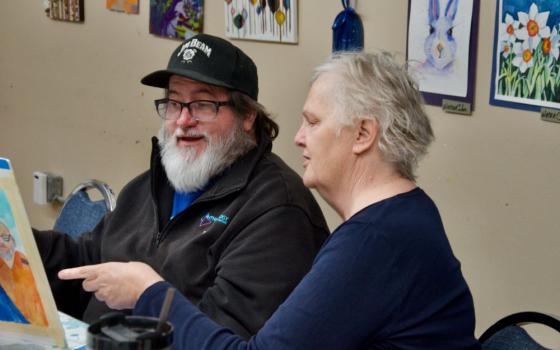
Students and staff at Maryland High School's assembly singing the Blessed Mother Marie-Rose hymn to celebrate the anniversary of her beatification. In the back row, left to right, are Sr. Lydia Lerato Rankoti, Miss Rannoni and Sr. Lucia Matima. Students Mosa Mokhakala (left) and Ithabeleng Montoeli play drums. (Courtesy of Lydia Lerato Rankoti)
When Pope Francis met with the bishops in mission territories in September 2018, he said "Mission is a free and conscious response to God's call." He also prayed for us to "touch and transform hearts, minds, bodies, societies and cultures in every place and time."
We thought of that on May 23 when we marked the celebration of the 1982 beatification of Marie-Rose Durocher. This year the Sisters of the Holy Names of Jesus and Mary were celebrating 41 years of this beautiful feast of our foundress, a woman of her times.
Marie-Rose (called Eulalie before she entered religious life) grew up like any other girl of her age, even though her life was exceptional because God had chosen her to be his. In different cultures, when a child is born, parents celebrate the birth with different expressions of their expectations for the child. For instance, in the Basotho culture of southern Africa, the child's initiating rituals take place in different stages. Kuruetso, for example, takes place when the baby is one month old. Parents show the baby the full moon to test its eyesight.
To prevent the child from becoming a rogue or a thief, it must be protected against even the smallest raindrops for two or three months after birth. Then, when there is a nice shower of rain, the child is taken outside and gently placed on the ground in the reed enclosure in front of the house. Here pouring rain will freely spatter over the baby for a few moments. The frightened infant will scream bitterly. The family all shout out in a mocking way, saying: "Ah! Behold the thief, the thief, the thief!" Suddenly the baby is picked up, wiped off, caressed and taken to the house.
Advertisement
Whenever a child engages in undesirable actions, people attribute the behavior to the parents' failure to nurture that child appropriately. For instance, when a teenager or a youth is ill-mannered or has committed a crime of any kind, his unacceptable behavior is associated with poor upbringing. Hence the saying, "ngoana ke seipone sa lelapa la bo" (A child is reflection of their family).
In a similar way, the Catholic Church also has a way of celebrating the birth of the child — by baptizing the baby. The sacrament of baptism includes two essential elements: the pouring of water over the head of the baby or the person to be baptized, and the words "I baptize you in the name of the Father, and of the Son, and of the Holy Spirit."
Eulalie was baptized the very same day she was born, on Oct. 6, 1811.
It goes without saying that Genevieve and Olivier Durocher wanted the best for their child, and they nurtured Eulalie in such a way that everyone would expect that she would become the great woman she became in the church. But others doubted that she would make it, because of her unstable health. Eulalie was sick, but God chose her anyway, which makes me believe that God is forever with us and God helps us in whatever he demands of our lives.
Blessed Marie-Rose Durocher teaches us — religious, lay people and those that will be religious — that the grace of God is forever with us in everything. The love that Marie- Rose spread to the people that she served, both before and after she became a religious woman, was incredible.
Therefore, the Sisters of the Holy Names of Jesus and Mary and the church have thousands of reasons to commemorate this day of her beatification. In formation and the novitiate, our formators instilled the good news about "Rose of Canada" in me and my other sisters, and we too shall educate others to celebrate this day and pray with us that one day the church pronounces her a saint.
The Beatitudes summarize Jesus' teaching about what it means to live deliberately as a child of God's kingdom (Matthew 5:3-12):
Blessed are the poor in spirit … those who mourn …the meek … those who hunger and thirst after righteousness … the merciful … the pure in heart … the peacemakers … those who suffer persecution for righteousness' sake … for theirs is the kingdom of heaven.
Marie-Rose, the woman of her times, the brave woman and the woman who loved God despite all her challenges, has exemplified for everyone the good qualities that we should live by, as it is written in the Holy Gospel above.
So it happened in this era, in our Lesotho Province, we were directed to commemorate this day in our communities. Sr. Lucia Matima (the Maryland Convent's superior) and I decided that we would celebrate the day with our students at Maryland High School, which is in the Leribe district of Lesotho.
Sister Matima began by leading with a prayer at the assembly, Miss Laetitia Rannoni helped us with singing, and I spoke about the importance of the day in the church, in our Holy Names' congregation, and in our congregation's ministries. Both teachers and students were astonished by Marie-Rose Durocher.
At nightfall, we celebrated Mass with Maryland High school's principal and Miss Rannoni, and afterwards had dinner with our priests. Not only did Maryland Convent celebrate, but the whole congregation did also, in different ways and cultures.
In the end, the Sisters of the Holy Names of Jesus and Mary stand together, holding onto one another, and living by our charism — which makes us able to read the signs of times, find a way to respond to them and give us an identity to speak. So then, like a creative fire, that charism has never stopped unfolding, diversifying and evolving, and becoming more visible to our eyes.
Indeed, isn't Marie-Rose blessed?







